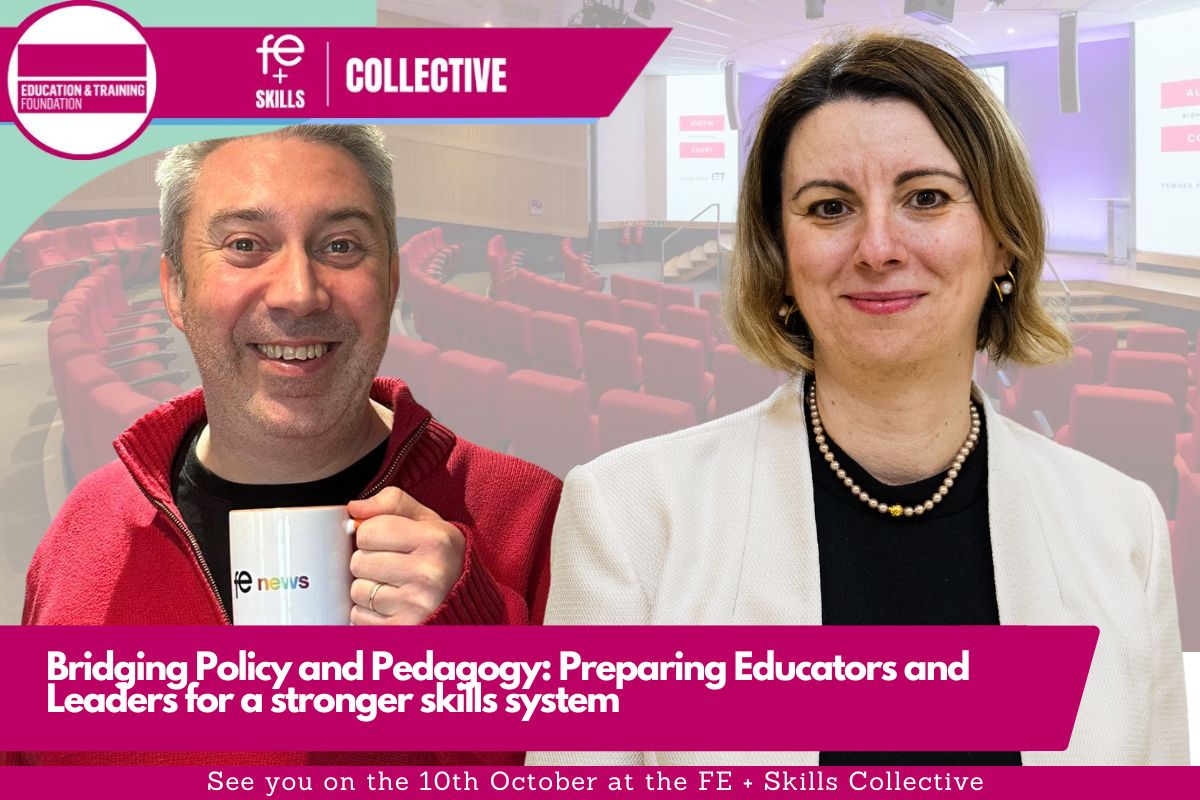#AntiRacismInAction: Apprenticeships | S2 Ep2

By the BFELG: #AntiRacismInAction: Apprenticeships with Tom Bewick, CEO, Federation of Awarding Bodies ; Jennifer Coupland, Chief Executive, Institute for Apprenticeships and Technical Education (IFATE); Cindy Rampersaud, NED and Trustee; , co-produced by BFELG and FE News, and co-anchored by Gavin O’Meara (CEO and Head of Digital, FE News), and Stella Ngozi Mbubaegbu CBE, BFELG Director.
BFELG uses * ’Black’ as an inclusive definition to refer to people from ethnically diverse backgrounds who share a lived experience of the effects of racism.
Today’s livestream Season 2 Episode 2 #AntiRacismInAction: Apprenticeships falls right in the middle of the 15th annual National Apprenticeship Week (NAW), a week-long celebration of apprenticeships. Happy National Apprenticeship Week to all!
NAW brings together businesses and apprentices across the country to shine a light on the positive impact that apprenticeships make to individuals, businesses and the wider economy. The theme for NAW 2022 is ‘Build the Future’; reflecting on how apprenticeships can help individuals to develop the skills and knowledge required for a rewarding career, and businesses to develop a talented workforce that is equipped with future-ready skills.
Coincidentally, the Levelling Up White Paper which sets out how the whole of government will spread opportunity more equally across the UK, was published just last week on February 2. ‘Skills’ is one of the ambitious medium-term missions identified in the White Paper to challenge, and change unfairness, giving everyone the opportunity to flourish.
Sadly, the data show that for *Black communities, the narrative is not a good one when it comes to participation and representation in Apprenticeships. With a slight increase from 12.5% to 14% currently, representation is low when compared to about 30% (over-representation) on general further education programmes including Traineeships (with unpaid employment). Interesting that Apprenticeships offer paid employment and Traineeships offer unpaid employment, In addition, participation in Apprenticeships is concentrated in low paying sectors such as Health and Social, and Business Administration. We should stop and ask the question – ‘what is going on?’ Another dimension that is of grave concern is that since Covid, the unemployment rate of *Black 16-24 year olds has doubled to 42% compared to their white peers (9% to 12%). Will we see a corresponding decrease in *Black representation in apprenticeships?
To explore the unique opportunities and challenges faced by the Apprenticeship system in respect of ethnic diversity, and the success factors in seeking to address these to build a better and fairer future for all, this Episode 2 brings together as guests, systems leaders with passion for and formidable experience of the world of Apprenticeships: Tom Bewick, CEO, Federation of Awarding Bodies ; Jennifer Coupland, Chief Executive, Institute for Apprenticeships and Technical Education (IFATE); Cindy Rampersaud, NED and Trustee.
Introducing the Episode, Tom Bewick, Chief Executive, Federation of Awarding Bodies (FAB) reflected on what anti-racism means to him and why it matters. Inspired by the beautiful words of the late reverend Martin Luther King, Tom trailed King’s dream of his children growing up in a society where it was the content of their character, not the colour of their skin, that should be judged by other people. Tom also spoke about the need to call out racism, to join together, act with fortitude, and say ‘we just won’t tolerate it’. Whilst celebrating another national apprenticeship week Tom urged that we should not forget some of the progress we’ve all been making, but also continue to challenge ourselves too. Like King, we need to keep on dreaming. Complacency is still our biggest enemy. ‘By genuinely working together; having those honest and at times difficult conversations, we can build an FE, skills and apprenticeship system that is about the content of the curriculum; the diversity in what people can learn, but it is never about the colour of peoples’ skin!’
In the wide ranging discussion that followed, Jennifer Coupland highlighted current opportunities for the Apprenticeship system in respect of ethnic diversity including: employers’ eagerness to use apprenticeships to diversify their workforce and tackle the skills shortage; quality of apprenticeship programmes; opening up of new career routes through apprenticeships. IfATE’s contributions to the agenda include: proofing the design of its products; diversifying the membership of its employer-panels that design apprenticeship standards and technical qualifications such as T levels, and raising awareness of racism, diversity and inclusion through live conversations. An inclusion network led by staff has been established. Externally, IfATE is also using its influencing and convening power to stimulate debate on this agenda with other organisations. Jennifer pointed out, however, that there are challenges to tackling what is after all a longstanding and complex problem, requiring, multi-pronged and concerted efforts to achieve improvements in ethnic diversity participation and representation at every stage and at different points of the system. For example, school pupils need access to high quality careers advice and guidance about apprenticeships and technical qualifications.
Cindy Rampersaud spoke about the importance of data and the need to identify the root cause of under-representation. Whilst celebrating the growth of apprenticeship routes to prestigious professions such as accountancy and law, employers need to be careful not to replicate the current demographics of most of their graduate trainee programmes which are less than diverse. Cindy highlighted the opportunity, coming out of Covid, to harness the massive talent pool we have as a country in order to address the global skills gap. Access to apprenticeships and employment becomes even more important and all concerned need to work much harder, for example, to raise awareness of apprenticeships in certain communities, and with young and individuals who may be excluding themselves from opportunities. She pointed out that the balance of power appears to be shifting from business and organisations to the workforce and the talent pool, as individuals are making choices about who they work for. Consequently, employers must ‘walk the talk’ of valuing a diverse workforce and be ready to have open conversations about race equality.
Stakeholders mentioned in discussions included the Association of Apprentices, Safaraz Ali, social entrepreneur and founder of the BAME Apprenticeship Awards.
Watch Episode 2 for the full discussion and to hear Jennifer Coupland, Cindy Rampersaud and co-hosts share their dream scenarios for #AntiRacismInAction: Apprenticeships.
About the Institute for Apprenticeships and Technical Education
The Institute for Apprenticeships and Technical Education (IfATE) is an employer led organisation that supports technical education and apprenticeships in the United Kingdom, through qualifications such as T Levels. It is funded by the Department for Education of the Government of the United Kingdom.
Our vision is for a world-leading apprenticeships and technical education system, that equips people from all backgrounds for skilled occupations contributing to increased economic productivity.
The Department for Education sponsors us; however, an independent chair oversees our work. This chair leads a board of employers, business leaders and their representatives to make sure the apprenticeships and technical products are of the highest quality.
What we do
A key element of our work is supporting employer groups in the development of the apprenticeships. We maintain the occupational maps which underpin all technical education. We develop, approve, review and revise apprenticeships and technical qualifications with employers. This includes responsibility for T Levels delivery and for implementing an approval process for higher technical qualifications.
About the Association of Apprentices
The Association of Apprentices is a membership association, for apprentices and led by apprentices which creates a community for the UK’s almost one million apprentices. AoA aims to provide the social and broader elements often missing from apprenticeship programmes, access to advice and guidance which supports life-long career development, and a lifetime of professional networks.
About the Federation of Awarding Bodies
The Federation of Awarding Bodies is the collective voice of the UK’s world-class qualifications and assessments industry. Our members are committed to providing high-quality qualifications and assessments that recognise achievement, improve productivity, support social mobility and change lives.
Our vision is of a powerful trade association representing the collective interests of the UK’s qualifications and assessments industry. We envisage a world in which higher-quality technical, professional and vocational education, results in stronger public confidence in what we do.
About The BAME Apprenticeships Awards
Previously the Asian Apprenticeship Awards, the BAME Apprenticeship Awards aims to showcase talent and diversity within BAME communities through the celebration of those working hard to overcome adversity to achieve their goals through apprenticeships. The awards highlight the achievements of apprentices and the contribution of employers and learning providers who have assisted them along their journey.
Stella Ngozi Mbubaegbu CBE, Black Further Education Leadership Group










Responses